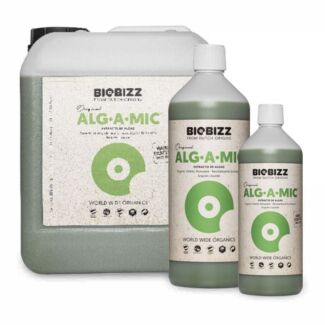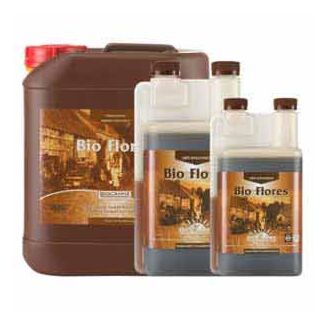Fertilizers
Fertilizers are essential for cannabis cultivation, providing necessary nutrients for healthy growth. From macronutrients like nitrogen, phosphorus, and potassium to micronutrients like zinc and iron, these elements are key to flowering and cannabinoid production. It's crucial to understand the specific needs of the plants at each stage of their cycle to apply fertilizers correctly and avoid nutritional imbalances. The choice of quality fertilizers, whether organic or synthetic, can make a difference in the final harvest's quality and quantity.
Types of Fertilizer
There are two main categories of fertilizers for cannabis:
- Organic fertilizers: Derived from natural materials such as compost, manure, and bone meal, these fertilizers release nutrients slowly and steadily, improving soil health in the long term and contributing a more natural flavor to the flowers. They are an ideal choice for growers seeking a sustainable and eco-friendly approach.
- Chemical fertilizers (synthetic): Formulated with synthesized nutrients, these fertilizers provide quick and precise nutrition to the plants, being useful for quickly and efficiently correcting specific nutrient deficiencies.
Proper fertilizer application is essential to avoid issues like overfeeding or nutrient deficiency. It is crucial to follow the manufacturer's instructions and keep a careful record of the applied dose.
It's important to note that cannabis nutrient needs vary throughout its lifecycle. During the vegetative stage, plants require higher nitrogen levels to promote foliage growth, while during flowering, they need a higher ratio of phosphorus and potassium to stimulate bud production.
Organic vs. Inorganic Fertilization
The choice between organic and inorganic fertilizers often depends on the grower's preferences and cultivation philosophy. Organic fertilizers are usually gentler on plants and can improve soil quality over time, but they tend to act more slowly and may require more experience for effective application. In contrast, inorganic fertilizers are faster and more precise in their action, but they can accumulate salts in the soil if used excessively.
Essential Elements in Cannabis Fertilizers
For healthy growth, cannabis fertilizers should contain a balanced combination of macronutrients and micronutrients:
Macronutrients:
- Nitrogen (N): Essential for vegetative growth, stimulates leaf and stem development.
- Phosphorus (P): Fundamental for root development and flowering.
- Potassium (K): Strengthens cell walls, improves disease resistance, and promotes flower production.
Micronutrients:
- Calcium (Ca): Contributes to cell structure, root development, and nutrient absorption.
- Magnesium (Mg): Essential for photosynthesis and chlorophyll production.
- Sulfur (S): Important for protein and enzyme formation.
- Iron (Fe): Necessary for photosynthesis and cellular respiration.
- Zinc (Zn): Involved in the synthesis of auxins, plant hormones important for growth.
- Copper (Cu): Assists in photosynthesis and cellular respiration.
- Manganese (Mn): Important for photosynthesis and nutrient metabolism.
How to Choose the Right Fertilizer
The selection of the right fertilizer depends on several factors:
- Growth stage: During the vegetative phase, fertilizers rich in nitrogen are needed to stimulate leaf and stem growth, while in the flowering phase, higher phosphorus and potassium content is required to support flower production.
- Type of cultivation: Organic fertilizers are ideal for those seeking a sustainable and eco-friendly option, while chemical fertilizers provide quick and precise nutrition.
- Specific plant needs: Observe the plants to detect signs of nutrient deficiencies or excesses and adjust fertilization accordingly.
Fertilizer Application During Cultivation, at Different Stages:
- Seedling / Cuttings: Use mild, low-concentration fertilizers to avoid burning young roots.
- Vegetative: Gradually increase nutrient concentration, focusing on nitrogen-rich fertilizers.
- Flowering: Switch to fertilizers with higher phosphorus and potassium content to support flower formation.
- Root flushing: At the end of flowering, perform a root flush to remove excess salts and improve bud flavor and quality.
*Watering: Perform regular watering without fertilizer to prevent salt buildup.
By understanding the types of fertilizers available, the essential elements that cannabis plants need, and how to apply them correctly at each growth stage, you can consistently cultivate high-quality buds. Always start with low doses and adjust as needed, and soon you will be enjoying a bountiful and superior quality harvest.
Frequently Asked Questions:
What is the difference between organic and chemical fertilizers for cannabis?
- Organic fertilizers are composed of natural materials, such as compost and manure, and release nutrients slowly and steadily. Chemical fertilizers, on the other hand, contain synthesized nutrients and provide quick and precise nutrition to the plants.
What are the key elements that cannabis fertilizers should contain?
- Cannabis fertilizers should contain the three main macronutrients: nitrogen (N), phosphorus (P), and potassium (K), as well as a variety of micronutrients such as calcium, magnesium, sulfur, iron, zinc, copper, and manganese.
Is it necessary to use special fertilizers for each growth stage of cannabis?
- Yes, during the vegetative phase, fertilizers rich in nitrogen are needed for leaf and stem growth, while in the flowering phase, more phosphorus and potassium are required for flower development.
How much fertilizer should I apply to my cannabis plants?
- The amount of fertilizer depends on several factors, including the plant's growth stage, the type of fertilizer used, and the specific needs of the plants. It is always recommended to follow the manufacturer's instructions and start with low doses, gradually increasing as needed.
How can I tell if my cannabis plants have nutrient deficiencies?
- Nutrient deficiencies manifest as symptoms such as leaf discoloration, yellowing, spots, or deformities. Consult a nutrient deficiency guide to identify specific problems and take corrective measures.
What is the ideal fertilization frequency for potted cannabis plants?
- The fertilization frequency can vary depending on soil type, fertilizer type, and plant needs. Generally, it is recommended to fertilize every 1-2 weeks during the active growth phase.
Can I use fertilizers for other types of plants in my cannabis cultivation?
- It is possible, but it is important to ensure that the fertilizers used provide the necessary nutrients for cannabis and avoid products that may be harmful or toxic to the plants.
Is it safe to use chemical fertilizers in cannabis crops intended for human consumption?
- When used correctly and following the manufacturer's instructions, chemical fertilizers can be safe for cannabis cultivation intended for human consumption. It is important to avoid over-fertilization and thoroughly flush the plants before harvest.
Can I make my own organic fertilizer for cannabis at home?
- Yes, it is possible to make homemade organic fertilizers using ingredients such as compost, manure, banana peels, among others. However, it is important to ensure that the nutrients are balanced and avoid potential contaminants.
What should I do if my cannabis plants show signs of overfeeding with fertilizers?
- If the plants show signs of overfeeding, such as burnt leaf tips, it is important to flush the soil with clean water to remove excess salts and allow the plants to recover.
Are there differences between the nutrient requirements of indica, sativa, and hybrid cannabis varieties?
- While the basic nutrient needs are similar among cannabis varieties, some varieties may have slightly different requirements based on their genetic characteristics and growth patterns.
Should I change my fertilization regime when growing cannabis indoors versus outdoors?
- The fertilization regime may vary depending on growing conditions, but generally, indoor cannabis plants may require more controlled nutrition due to the lower availability of soil nutrients.
What measures can I take to avoid salt buildup in the soil due to fertilization?
- To avoid salt buildup, it is important to water the plants with clean water regularly and perform periodic root flushes to remove excess nutrients from the soil.
What is the environmental impact of fertilizers used in cannabis cultivation?
- Excessive or improper use of fertilizers can negatively impact the environment, such as water contamination and soil degradation. It is important to use fertilizers responsibly and follow sustainable agricultural practices.
Are there natural alternatives to commercial fertilizers for cannabis that I can use safely?
- Yes, there are numerous natural alternatives, such as compost, manure tea, seaweed meal, and other organic products that can provide nutrients to cannabis plants safely and effectively.
























